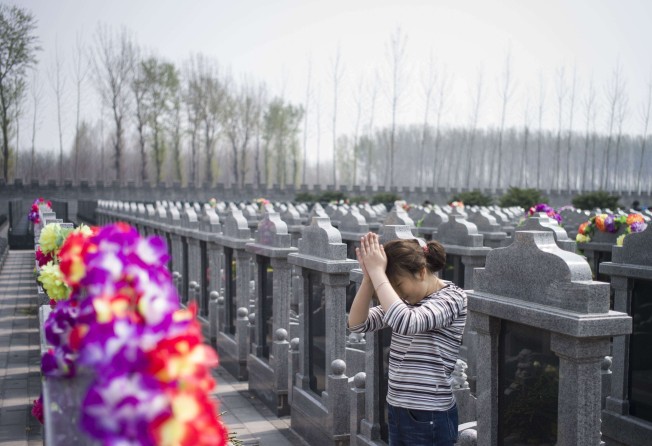As Chinese honour dead ancestors, illegal practise of ghost marriages still lingers
Villagers are willing to pay hundreds of thousands of yuan for a female corpse to bury alongside an unmarried deceased male, Xinhua reports

As Chinese across the nation honour their ancestors by visiting their graves this week, state media has drawn attention to one ugly side of traditional views about death.
Xinhua ran a report about the black market trade in corpse-stealing, in which families obtain a dead woman to bury alongside an unmarried male so he will not be alone in the afterlife.
The practice, known as “ghost marriages”, was banned by the government in 1949 but continues to exist in remote villages, especially in the north.
The trade can be lucrative for criminals willing to source the bodies, sometimes by murder, with families willing to pay hundreds of thousands of yuan for a corpse.
In Hongtong, a county with a population of about 760,000 in Shanxi province, 27 female bodies have been reported stolen since 2013, according to the Xinhua report. But the actual number could be much higher, as some villagers might feel too ashamed to report to officials that a body of a deceased family member had gone missing.
During last year’s tomb-sweeping festival, known as Ching Ming, county resident Zhang Gainong, not his real name, spent 180,000 yuan (US$26,145 or HK$203,175))to purchase a young girl’s body to bury with his dead son, according to Xinhua. He often checked the site to ensure it had not been disturbed and the woman’s body stolen and sold again.
Another resident, Jing Gouzi, spent 3,000 yuan for a female corpse in 2015 to pair with his dead elder brother. For a county with a rural per capita gross domestic product just above 8,000 yuan, the ritual can be a financial burden.
“We said making a dummy body might be enough, but the elderly in our village refused, saying it would set a bad example for our children,” Jing’s wife Xing Xueli was quoted as saying.
Since 2012, China’s criminal courts have decided on more than 40 “ghost marriage” cases, according to an online database of court judgments.
Last December, Hongtong County People’s Court sent two men from Linfen city to jail for “insulting a corpse”. According to a court document, in 2012, Qiao Yuxi sold a female body through middleman Zhang Jianwei to a villager for 8,800 yuan. In return, Zhang received 2,100 yuan.
To fend off tomb raiders, some rural residents will sleep beside their female relatives’ tombs for weeks at a time, cement the tombs with concrete, or even build tombs inside their villages, the report said.